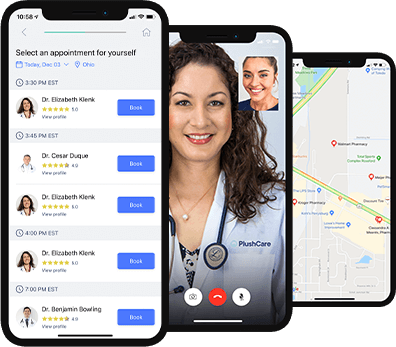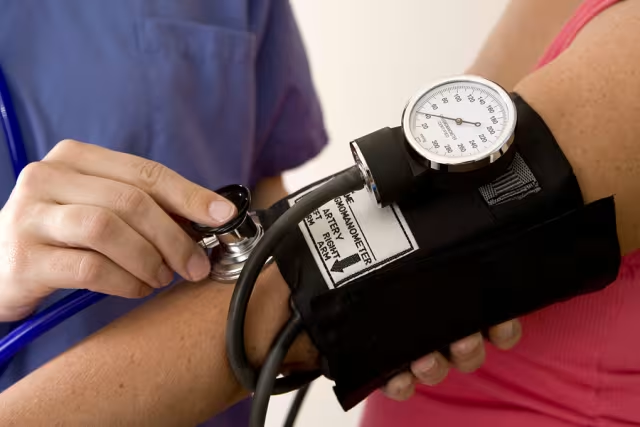Maintaining a healthy blood pressure is vital for overall health and well-being. While lifestyle factors like diet and exercise play a significant role in this, it's important to also be aware that certain medications may unexpectedly raise blood pressure levels.
Drug-induced hypertension refers to high blood pressure that is caused or brought on by certain medications. While medications are designed to treat many conditions, some can also lead to elevated blood pressure levels in certain individuals. This can occur due to several mechanisms, including vasoconstriction, fluid retention (edema), or interference with the body's regulatory systems.
Below, we'll explore some common medications that may raise blood pressure, explaining their potential effects. Knowing about these medications can help you make informed decisions and collaborate effectively with your clinician to manage your blood pressure effectively.
Common medications that may raise your blood pressure include the following:
1. Non-steroidal anti-inflammatory drugs (NSAIDs)
NSAIDs such as ibuprofen, aspirin, and Aleve (naproxen) are commonly used for pain relief and reducing inflammation. However, these medications also have been known to increase blood pressure in certain individuals.
They work by inhibiting enzymes that control blood vessel dilation, potentially leading to constriction of blood vessels and increased blood pressure. If you have hypertension or are at risk, it's important to talk about alternative pain management strategies with your doctor.

1
Book on our free mobile app or website.
Our doctors operate in all 50 states and same day appointments are available every 15 minutes.
2
See a doctor, get treatment and a prescription at your local pharmacy.
3
Use your health insurance just like you normally would to see your doctor.
2. Oral contraceptives
Oral contraceptives, commonly referred to as birth control pills, contain hormones that regulate a woman's menstrual cycle. However, some oral contraceptives, especially those with higher levels of estrogen, may raise blood pressure levels in certain people.
If you have a history of or at risk for hypertension, it's important to speak to your doctor to discuss alternative contraceptive options that may have a lower impact on blood pressure.
Read: High Blood Pressure Treatment
3. Decongestants
Decongestants, often found in over-the-counter cold and allergy medications, provide temporary relief from nasal congestion. However, they can constrict blood vessels, therefore increasing blood pressure. Continued use or excessive doses of decongestants may have a significant effect on blood pressure.
Individuals with hypertension or heart conditions should be cautious when using decongestants.
4. Steroid medications
Steroid medications, also known as corticosteroids, are commonly prescribed to reduce inflammation and manage various conditions like asthma, arthritis, and autoimmune diseases. While effective for their intended purposes, steroids can cause fluid retention and sodium retention, leading to an increase in blood pressure.
Regular blood pressure monitoring and open communication with your healthcare provider are crucial when using steroids for prolonged periods. They may recommend lifestyle modifications or additional medications to help manage fluctuations in blood pressure.
5. Certain antidepressants
Certain antidepressant medications, specifically tricyclic antidepressants (TCAs), monoamine oxidase inhibitors (MAOIs), and serotonin-norepinephrine reuptake inhibitors (SNRIs) have been associated with increases in blood pressure.
These medications work by regulating neurotransmitter levels in the brain, affecting the overall balance of various bodily systems, including the regulation of blood pressure. Neurotransmitters refer to the chemical messengers of the brain.
If you have or are at risk of high blood pressure, your physician may consider alternative antidepressant options or combine medication with other interventions to reduce any potential increase in blood pressure.
While medications can significantly improve our health and quality of life, it's crucial to be aware of their potential impact on blood pressure. It is essential for individuals taking these medications to be aware of the possible effects and regularly monitor their blood pressure, working closely with their doctor to manage any drug-induced hypertension and explore alternative treatment options if necessary.
Our trusted, board-certified doctors can help answer your questions about drug-induced high blood pressure and medications that may lead to increased blood pressure. They can also provide you with alternate treatment options to find the best treatment plan for you, while reducing the risk of hypertension. Book an appointment with one of our physicians to learn more today.

1
Book on our free mobile app or website.
Our doctors operate in all 50 states and same day appointments are available every 15 minutes.
2
See a doctor, get treatment and a prescription at your local pharmacy.
3
Use your health insurance just like you normally would to see your doctor.
Understanding the relationship between certain medications and blood pressure fluctuations can empower you to engage in informed discussions with your doctor.
Regular blood pressure monitoring, open communication, and commitment to prescribed treatment plans are key to effectively managing blood pressure while addressing underlying medical conditions.
Read more about high blood pressure:
Sources:
PlushCare is dedicated to providing you with accurate and trustworthy health information.
Mayo Clinic. Blood pressure: What's normal, what's not. Accessed on May 16, 2023 at https://www.mayoclinic.org/diseases-conditions/high-blood-pressure/in-depth/blood-pressure/art-20045245.
MedlinePlus. High blood pressure. Accessed on May 16, 2023 at https://medlineplus.gov/ency/article/000155.htm.
U.S. Pharmacist. Drug-Induced Hypertension. Accessed on May 16, 2023 at https://www.uspharmacist.com/article/drug-induced-hypertension.



